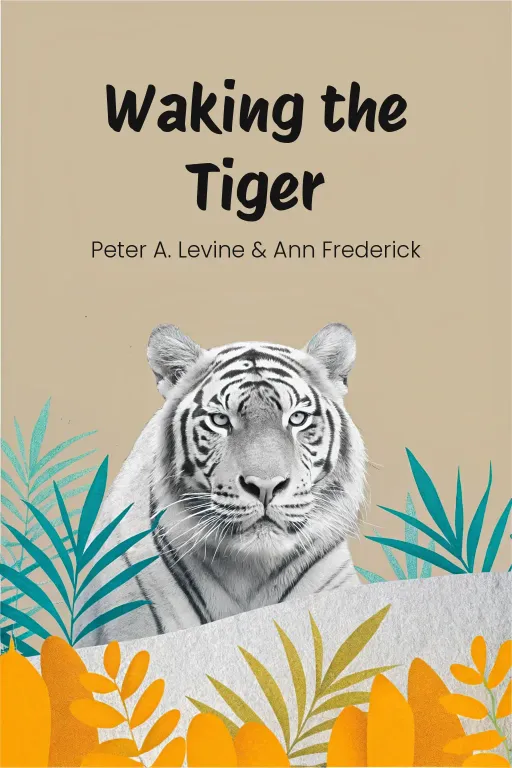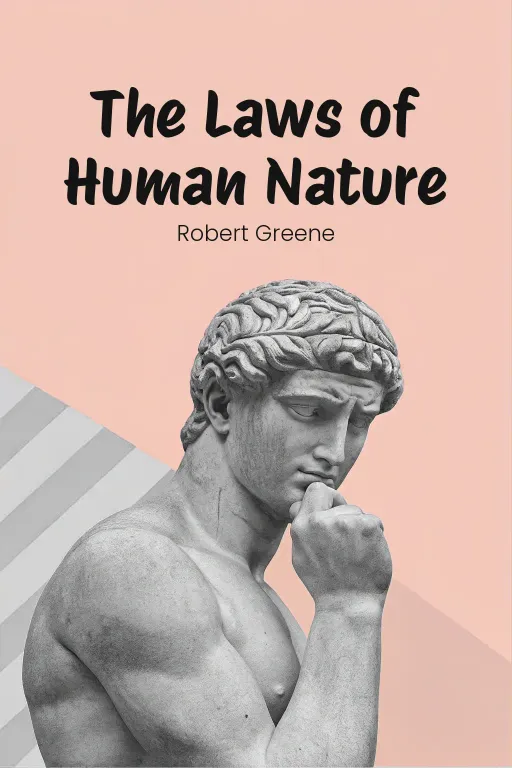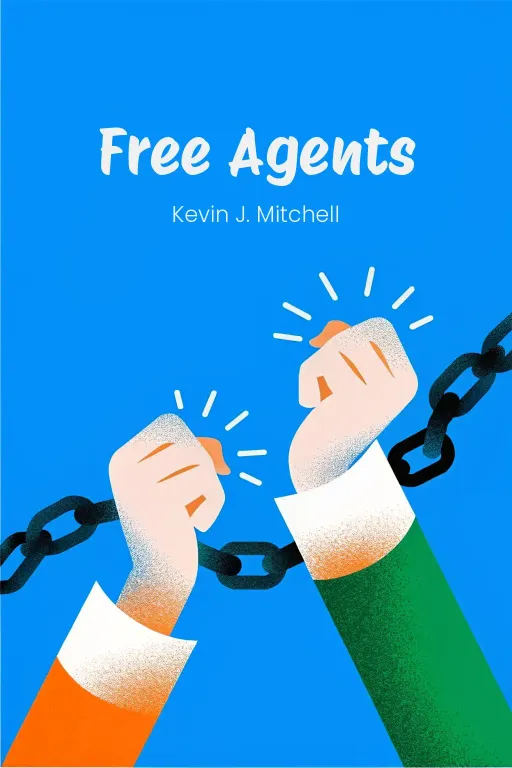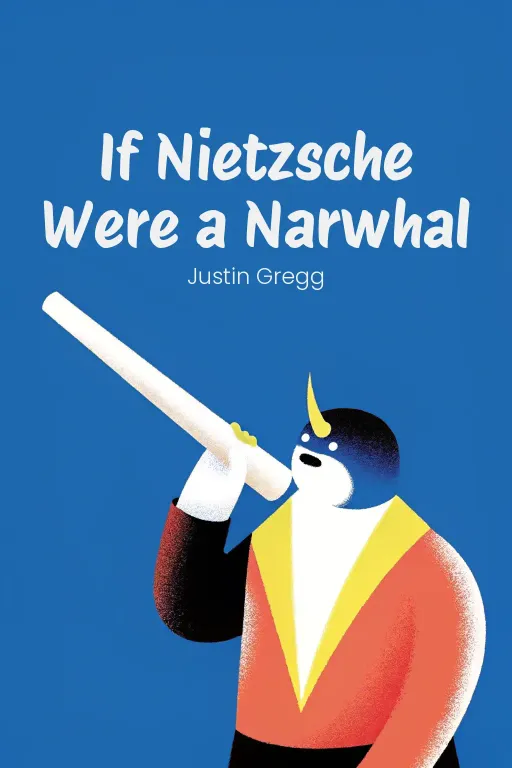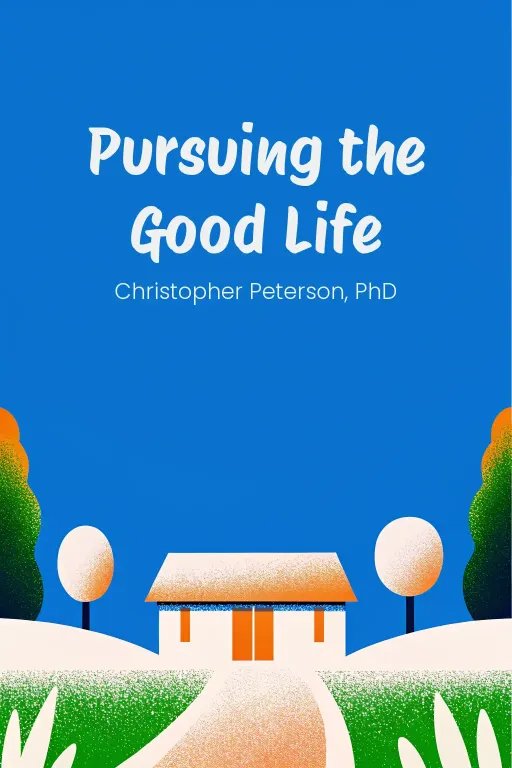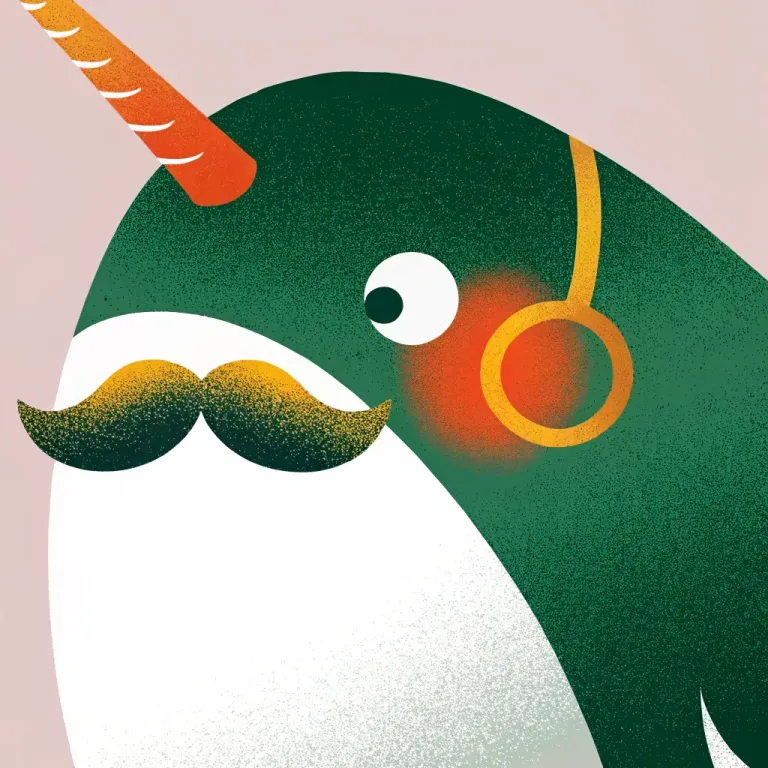
Are We Too Smart for Our Own Good?
Podcast by The Mindful Minute with Autumn and Rachel
What Animal Intelligence Reveals about Human Stupidity
Introduction
Part 1
Autumn: Rachel, have you ever stopped to wonder if being super “smart” is actually a gift… or more like a curse in disguise? Rachel: <Scoffs> You mean like back when everyone thought throwing their life savings into GameStop was some kind of genius move? Autumn: Precisely! Today, we're diving deep into the whole concept of human intelligence, and tackling a pretty big question: has our knack for thinking and inventing actually improved our lives, or have we just… outsmarted ourselves? Rachel: Right, exactly, because when you stack us up against nature's all-stars—like scrub jays, elephants, even those tiny bacteria—suddenly, our “genius” starts looking a little… well, questionable. Autumn: That's where today’s book comes in. It takes a really close look at how we think, our morals, and what we're even aware of, and then compares all that to the simpler instincts that animals have. Using stories like the GameStop craze and even Nietzsche's thoughts on feeling lost in life, it makes us question whether being smart really means being happy—or even surviving in the long run. Rachel: Alright, so we’re going to break this down into three parts: First, we’ll explore how our need to always ask "why" might be getting in the way of us just, you know, living well. Autumn: Then, we’re going to untangle the interesting story of morality and deception—something that both humans and animals do, but in some really different ways. Rachel: And finally, we'll ask: can humans ever actually use our intelligence responsibly, or are we just doomed to keep ignoring the lessons that nature's been trying to teach us all along? Autumn: It's a seriously interesting—and kind of humbling—look at the confusing thing that is human intelligence. So, let’s jump in!
The Paradox of Human Intelligence
Part 2
Autumn: Okay, let's kick things off by talking about what “really” separates us humans from the rest of the animal kingdom: our endless need to ask "why." Rachel: Right, that insatiable desire to figure out the universe, only to wonder if we even want to know the answers. Autumn: Exactly! Nietzsche was spot-on when he said humans are burdened by this constant search for meaning. Animals, on the other hand, they're free from all that. They just… exist. No overthinking, no existential crises. Rachel: Sounds kind of nice, actually. Meanwhile, we're like toddlers constantly demanding to know "why" about everything, from the sky's color to the meaning of life. Oh, and why GameStop stock went crazy! Autumn: And that whole GameStop thing “really” highlights how our intelligence can be both a blessing and a curse. Take Mike McCaskill. He spent two decades studying financial markets, right? Analyzing trends, strategizing, bouncing back from huge losses. And then, bam, he hits it big with the GameStop squeeze, turning $25 million. Rachel: Definitely a win born of hard work. Although, wasn't his victory “really” just luck and timing, dressed up as some sort of financial genius? Autumn: That's the crazy part. All that reasoning got him the right answer that one time, but after years of stress, failures, and big risks. But get this: in a stock-picking challenge, a cat named Orlando – who literally "picked" stocks by stepping on them – beat professional investors! Rachel: Wait, so McCaskill grinds for 20 years, and a cat does better by just… being a cat? Autumn: Pretty much! The whole thing just underscores how we humans can overthink and complicate decisions, often to our own detriment. Turns out, sometimes less “really” is more. Rachel: Makes you wonder, doesn't it? When intelligence leads to stress, financial ruin, or just plain wasted energy, is it actually dumber than instinct? I can't believe I'm even saying that. Autumn: Well, instincts, like Orlando's simple choices, often sidestep the pitfalls of overthinking. And it's not just about investing. Animals keep showing us that straightforward, experience-based actions can be more effective than complex reasoning. Rachel: Are you talking about the bettong example? Autumn: Exactly! The bettong, that little endangered marsupial, it's a perfect example of efficiency versus complexity. When a new predator shows up, it doesn't sit around theorizing. It learns from experience immediately – observe, adapt, survive. No theories, no debates. Rachel: A creature straight out of the "act now, think later" handbook. Compare that to us humans, who'll overanalyze a problem until we're paralyzed by indecision. Autumn: Exactly, and while those instinctual behaviors might seem primitive, they're incredibly effective. Animals act with a clarity and purpose that we've kind of lost, weighed down by our mental processes that often complicate the most basic goals. Rachel: It's like hiring a hundred consultants to figure out how to eat an apple when the squirrel in your backyard already knows how. Autumn: Exactly! And yet, we justify all this complexity by saying it leads to progress—science, medicine, infrastructure… Rachel: Sure, but at what cost? How many sleepless nights, existential crises, and GameStop-style risks come with all that "progress?" Autumn: So that's the big question, isn't it? Is intelligence inherently valuable, or is it only valuable when it's balanced with the kind of simplicity animals seem to have mastered? Rachel: To me, it’s not just balance. It’s about humility. Recognizing when we’re outsmarting ourselves… or when a cat is actually better at your job than you are.
Morality and Deception Across Species
Part 3
Autumn: This inherent duality of intelligence makes you wonder about its evolutionary purpose, right? And how it stacks up against the simpler, instinct-driven survival strategies of animals. Looking at morality and deception is a really interesting way to explore that. Rachel: Okay, morality and deception, huh? Sounds like we're diving headfirst into the messy parts of human nature. Let me guess, we’re about to discover we’re not as high-minded as we like to think? Autumn: Pretty much! Morality, on the one hand, shows how intelligence allows us to build complex ethical systems and societies. But it also lets us justify some pretty horrifying actions. Then there's deception, a survival tactic we share with animals, but we've supercharged it into something far more sophisticated—and sometimes destructive. Rachel: Alright, so let’s tackle morality first. What is it that makes human morality so…complicated? Autumn: Well, human morality is really shaped by both reasoning and culture. It's not just about instinct or basic survival; it's connected to our ability to think deeply, analyze situations, and then rationalize our actions. But, that complexity creates openings for moral failures on a grand scale. Take the Canadian residential school system as a good example. Rachel: Ah yes, the "moral" excuse for cultural genocide. If I remember correctly, we’re talking about the 19th and 20th centuries, when Indigenous children were forcibly removed from their families and placed in these institutions under the guise of "civilizing" them? Autumn: Exactly. The guy behind the system, Sir John A. Macdonald, actually justified those terrible acts as a moral imperative. He genuinely believed that Indigenous children needed to abandon their languages and traditions to align with European-centric ideals. It was framed as "helping" them, but the reality was devastating—broken families, loss of culture, and trauma that has lasted generations. Rachel: It’s mind-boggling, isn't it? The sheer devastation, all hidden behind the language of morality. Animals might fight over territory, but they don’t create elaborate systems to justify oppressing an entire group of people. Autumn: Exactly! And that’s where the comparison gets really interesting, right? Animal morality, if you can even call it that, works on much simpler principles. It's mostly instinctual, with the goal of promoting cooperation and survival. Elephants, for instance, show altruism by protecting and caring for weaker members of their herds—without any kind of philosophical or ideological justification. Rachel: Right, no manifestos or moral philosophy needed. Just simple, cooperative behavior. In a way, it’s elegant. Autumn: Completely. Human morality, in contrast, cuts both ways. It makes it possible to establish civil rights and fight for social justice, but it also allows us to rationalize atrocities like colonialism. Rachel: So we’re like ethical architects, but we use the same blueprint to design both beautiful skyscrapers and guided missiles. Autumn: You could say that. And morality is really just one piece of the puzzle. Deception is another area where the human-animal comparison is fascinating. Rachel: Deception—okay, animals are pretty good at this, right? Camouflage, mimicry, just general trickery to survive. But I’m guessing we humans have taken it far beyond hiding from predators. Autumn: You’re spot on. At its core, deception is really about influencing others to gain a strategic advantage. And we see that across many species. For instance, studies have shown that dogs are capable of tactical deception. If a dog knows its owner will always go for its favorite treat, it might lead them to a less desirable one, and then sneak back later to get the preferred treat. Rachel: Dogs as little con artists? I love it. But I’m guessing that’s, like, kindergarten-level deception compared to what humans do? Autumn: Exactly. Human deception is amplified by language and our understanding of other people’s thoughts—what psychologists call "theory of mind." That lets us manipulate on a much larger scale, from political propaganda to online scams. Think about the GameStop short squeeze in 2021. Rachel: Ah yes, the financial drama. Let me guess—deception was used both offensively and defensively in that whole mess? Autumn: Precisely! Hedge funds were short-selling GameStop, basically betting that its stock price would go down. At the same time, retail investors on Reddit worked together to artificially raise the stock price, which caused massive losses for the hedge funds. Both sides were manipulating information and systems in different ways; it really showcased human deception at its finest, or perhaps I should say, its worst. Rachel: Got it. Animals deceive for their immediate survival, like hiding food or blending into their surroundings. Humans, on the other hand, manipulate entire economies—and then congratulate themselves on being so clever. Autumn: Exactly, and that's the key difference here. Animals are relying more on instinctual deception as a way to adapt to immediate threats or opportunities. Humans use it to influence complex systems, often with really far-reaching and sometimes destructive consequences. Rachel: It’s a matter of scale, I suppose. A cuttlefish uses deception to avoid a predator; we use it to destabilize institutions or spread misinformation. The stakes are just astronomically higher for us. Autumn: And that’s why understanding both the parallels and the differences between human and animal deception is so important. It really highlights the immense responsibility that comes with our intelligence—and the potential for harm if we don’t use it wisely. Rachel: Okay, so here’s my takeaway. Morality lets us justify anything from civil rights to colonial atrocities. Deception helps with basic survival, but only humans use it to manipulate financial markets or sow chaos. Makes you wonder—are we just too smart for our own good? Autumn: Or maybe not smart enough, Rachel. Our intelligence gives us the tools, but using them wisely—that's the real challenge, the real test.
Reevaluating Intelligence in the Anthropocene
Part 4
Autumn: Understanding these moral and deceptive contrasts really makes you think about how human cognition impacts our planet and society, right? Which leads us to the Anthropocene – this era where humanity's impact is so huge, it's actually defining a geological epoch. Rachel: The Anthropocene, huh? Or as I like to call it, “Humans Made a Mess and Called It Progress.” So, I'm guessing we're talking about how our intelligence has been both the hero and the villain in this story? Autumn: Exactly! We're diving into the core of the discussion, which is rethinking intelligence's role in all this. The book argues that while our brains have given us incredible advances, they've also caused some serious problems, like environmental damage and using up all our resources. Rachel: Got it. So, the idea is that, even though we're smart, we're stuck in this cycle of creating and destroying. Intelligence is the tool, but we've misplaced the instruction manual. Autumn: That's a great way to put it. And you see this so clearly in something as simple as... lawns. Rachel: Lawns? You're telling me that perfectly cut grass holds the key to solving our problems? Autumn: Well, in a way, yes. It's a small example, but a powerful illustration. Keeping lawns perfect uses about 9 billion gallons of water every day in the US. And that's water we can barely afford to waste with all these droughts happening. Plus, the fertilizers and pesticides pollute the water. It's basically a recipe for ecological disaster, just for some short-term curb appeal. Rachel: So, we're using tons of resources to grow grass in places where it doesn't even want to grow. Brilliant! Autumn: Right? And the crazy thing is, we know this. There have been tons of studies warning us about the environmental costs. But, you know, social norms and pressure still tell us that a perfect lawn means you're successful or respectable. Rachel: Wait, let me make sure I understand. We're ignoring droughts and poisoning the environment because we decided that grass is a status symbol? Autumn: “Prognostic myopia” at its finest – that's a cognitive bias where we choose what feels good now over what's good for the future. It shows the big problem with how we use our intelligence in the Anthropocene. We focus on what's easy or looks good, instead of thinking ahead and taking responsibility. Rachel: It's almost like our intelligence gives us amazing tools, but we just slap them on like band-aids instead of fixing the real problems. Which, I'm guessing, leads us to the big example—the oil companies? Autumn: Exactly. Let's look at industry research from the 1960s. Scientists like Elmer Robinson were already pointing out how CO2 emissions from fossil fuels were dangerous, and even predicted climate change by the early 2000s if we didn't change anything. Rachel: Missing a warning is one thing, but these companies didn't just miss it – they buried it! Autumn: Precisely. They put short-term profits over the long-term health of the planet, speeding up oil extraction while downplaying the consequences. It wasn't like they didn't know; it was a calculated decision on a grand scale. Rachel: Makes you wonder, doesn't it? The same intelligence that created this advanced drilling technology also understood its disastrous impact. And, sadly, profit always seems to win. Autumn: It's another intelligence paradox: innovation creates the tools for progress, but also the tools for destruction, depending on how we use them. While the oil industry made money, we're now dealing with rising temperatures, crazy weather, and less biodiversity – issues that scientists saw coming. Rachel: It's like we unlocked all the universe's secrets and then burned down the library where we kept them. Autumn: Which brings us to an important point – what can we learn from those who don't burn down the library? Rachel: You're talking about animals again, aren't you? Autumn: Absolutely! Amid the chaos we create, simpler life forms, like the Clark's nutcracker – also known as the tookottsi – offer a different perspective. Rachel: I've heard of these birds. They hide thousands of seeds—I mean, tens of thousands—to survive the winter. Autumn: And in doing so, they actually help the ecosystem. Many of the seeds they forget about end up sprouting into new trees. While we often disrupt ecosystems just to survive, animals like the tookottsi seem to work with their environments. Rachel: So their intelligence might not involve data analysis or rockets, but it's perfectly designed to sustain the life around them. Autumn: Exactly. Their instinct-driven behavior reminds us that survival doesn't always need to be complicated. There's something brilliant in acting simply – doing things that benefit both the individual and the community, without overthinking or over-engineering things too much. Rachel: Makes you wonder, do humans put too much value on complexity, thinking it gives us control, when it just leads to unintended consequences? Autumn: That's the argument. If intelligence isn't guided by empathy and foresight, it leads to unbalanced outcomes. So, the lesson isn't to reject complexity altogether, but to rethink it. To make sure it's rooted in shared well-being, not just self-serving goals. Rachel: So the real challenge of the Anthropocene isn't just inventing smart solutions – it's being wise in how we use them. Autumn: That's where ethics, empathy, and humility meet intelligence. Shifting our perspective to align with ecological harmony requires a cultural and cognitive shift—learning from nature, not trying to dominate it.
Conclusion
Part 5
Autumn: So, to wrap things up, human intelligence... it's really a double-edged sword, isn't it? It's our greatest asset, allowing us to innovate and solve problems, but also our biggest burden because it enables us to overcomplicate things, even deceive and destroy on a grand level. Rachel: Exactly! We pat ourselves on the back for being so much smarter than, say, a squirrel, but the truth is, we often miss the simple elegance and balance that animals naturally possess to thrive. Think about it, the bettong's instant adaptation or the tookottsi accidentally reforesting areas... there's a lot of wisdom there for us to tap into. Autumn: Precisely. Intelligence itself isn't inherently good or bad—it's just a tool. The real question is, how are we going to use it? Will we keep exploiting and destroying, or can we shift our approach, grounding our decisions in empathy, foresight, and a sense of collective well-being? Rachel: Yeah and maybe… just maybe, take a hint from nature's playbook, right? Stop trying to over-engineer everything, stop trying to control everything, but just try to understand our place within it. Autumn: The paradox of human intelligence really comes down to this: survival isn't about outsmarting the world, but about living in harmony with it. Thanks for tuning in today. Rachel: Until next time, stay curious—and, you know, maybe rethink that automatically scheduled lawn sprinkler.




